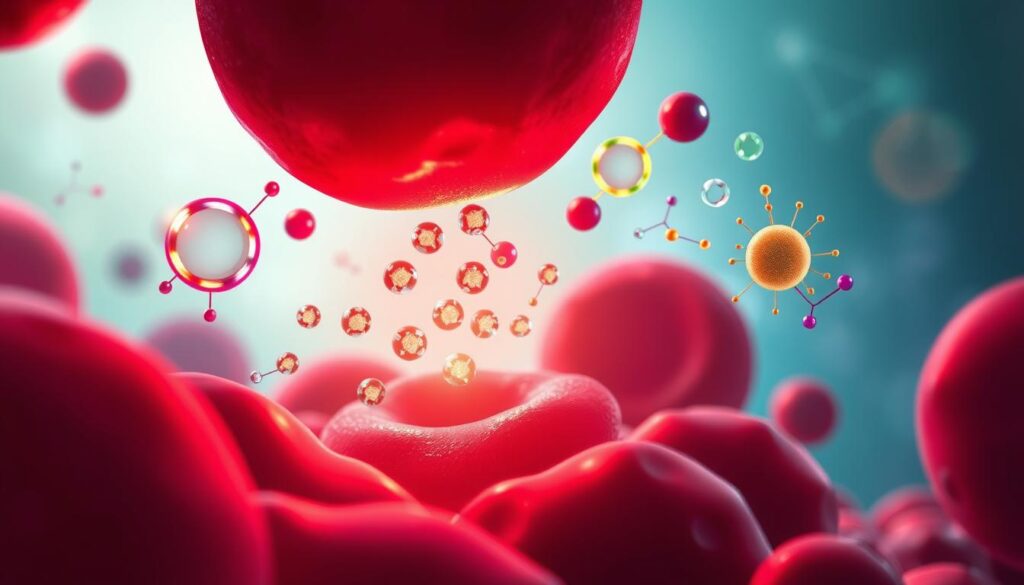Ever felt really tired, even after a good night’s sleep? It might be because you’re lacking iron. Iron is key for making hemoglobin, which carries oxygen in our bodies. This is why iron is important for our energy.
In this article, we’ll look at how iron supplements can boost your energy. They can help you feel more alive and ready to take on the day.
Sarah, a busy professional in her 30s, was always active. But lately, she felt really tired all the time. “I’d get home from work and feel like I had no energy left to do anything,” she remembers.
This tiredness was affecting her work and life. After seeing a doctor, Sarah found out she had an iron deficiency. This was causing her anemia and low energy. With iron supplements, Sarah’s energy came back.
Sarah’s story shows how iron supplements can fight fatigue. By knowing how iron helps our bodies and how to supplement it, we can feel more energetic. Let’s explore how iron supplements can increase your energy.
Understanding the Link Between Iron and Energy Production
Iron is key to our body’s energy-making process. It’s important to know how iron helps us stay energized. Let’s look into this connection closely.
The Role of Iron in Oxygen Transport
Iron is a main part of hemoglobin, which carries oxygen in red blood cells. When we breathe, our lungs take in oxygen. This oxygen is vital for our cells to make energy.
Without enough iron, our hemoglobin levels go down. This makes it hard for our body to get oxygen to our cells. This is bad for making energy.
How Iron Deficiency Affects Energy Levels
Iron deficiency makes us feel tired. When we don’t have enough iron, our body can’t make enough hemoglobin. This means our cells don’t get enough oxygen.
Without enough oxygen, our cells can’t make energy well. This leaves us feeling tired and without energy.
Cellular Energy Production and Iron
Iron is also important for making energy in our cells. It’s a key part of the mitochondria, where energy is made. When iron is low, our cells can’t make energy as well.
This means we have less energy and might feel tired or sluggish.
| Key Points | Description |
|---|---|
| Oxygen Transport | Iron is a key component of hemoglobin, which carries oxygen to our cells. |
| Iron Deficiency | Low iron levels can reduce hemoglobin production, leading to decreased oxygen supply and impaired energy generation. |
| Cellular Energy | Iron is essential for the mitochondria, where the process of converting nutrients into usable energy (ATP) takes place. |

“Maintaining adequate iron levels is crucial for optimal energy production and overall health.”
Common Signs You May Need Iron Supplements
Do you often feel tired, weak, or have trouble breathing? These could be signs of iron deficiency. It’s a common problem that affects many people. Spotting these signs early is key to keeping your energy up and feeling good.
Feeling tired all the time is a big sign of iron deficiency. Without enough iron, your body can’t make enough hemoglobin. Hemoglobin is what carries oxygen in your blood. This makes you feel tired, even after sleeping well.
- Weakness and lethargy
- Pale or sallow skin
- Shortness of breath, especially during physical activity
- Rapid or irregular heartbeat
- Headaches and dizziness
- Brittle nails and hair loss
If you’re seeing these signs, see your doctor. They can check your iron levels with a blood test. With the right supplements and diet, you can get your energy back.

| Symptom | Description |
|---|---|
| Fatigue | Persistent tiredness and lack of energy, even after rest |
| Pale Skin | Pale or sallow complexion due to low hemoglobin levels |
| Shortness of Breath | Difficulty breathing, especially during physical activity |
| Weakness | Feeling weak and lacking in physical strength |
| Dizziness | Lightheadedness or vertigo |
“Recognizing the early signs of iron deficiency is crucial, as it can help you take the necessary steps to restore your energy levels and overall health.”
The Science Behind Iron Supplements
Boosting your energy levels starts with understanding iron supplements. We’ll explore the different types of iron, how well they’re absorbed, and daily intake guidelines. This knowledge helps you choose the right supplements for your needs.
Different Forms of Iron in Supplements
Iron supplements come in various forms, each with its own benefits. The most common types are ferrous sulfate, ferrous fumarate, and ferrous gluconate. These differ in how well the body can use them.
Absorption Rates and Bioavailability
How well iron is absorbed and used by the body is key. Best iron supplements vary in absorption rates. Ferrous sulfate is often the most absorbed, but factors like digestive health and vitamin C intake also play a role in iron absorption.
Recommended Daily Intake Guidelines
Daily iron intake varies by age, gender, and health needs. Adults usually need 8-18 mg of iron daily. Pregnant women and those with certain health issues may need more. Always talk to a healthcare professional to find the right amount for you.

“Investing in the right iron supplements can be a game-changer in boosting your energy levels and overall well-being.”
Best Times to Take Iron Supplements
Timing is crucial when taking iron supplements. The best time can vary based on your needs and preferences. However, there are some general tips to help you get the most out of your supplements.
One key thing to think about is whether to take iron with or without food. Taking it on an empty stomach can boost absorption but might cause stomach issues. On the other hand, taking it with food can ease these problems but might slightly reduce absorption.
- For the best absorption, take iron 1 hour before or 2 hours after eating.
- If you get stomach upset, try it with a small snack or meal.
- Don’t take iron with antacids or antibiotics as they can block absorption.
Another thing to consider is how often you take your iron supplements. It’s better to split your daily dose into smaller amounts. This can help your body absorb it better and reduce side effects.
| Supplement | Optimal Timing | Absorption Rate |
|---|---|---|
| Ferrous Sulfate | 1 hour before or 2 hours after a meal | 20-30% |
| Ferrous Fumarate | 1 hour before or 2 hours after a meal | 30-40% |
| Ferrous Gluconate | With a meal | 12-15% |
By following these tips and consulting with your healthcare provider, you can make sure your iron supplements work well. They will help increase your energy and improve your health.

Combining Iron Supplements with Other Nutrients
Getting the most from iron supplements means thinking about how they work with other nutrients. Mixing iron with certain vitamins and minerals can really help our bodies use it better.
Vitamin C and Iron Absorption
Vitamin C is a key player in helping our bodies absorb iron. It boosts how well we take in iron from plant-based foods. Adding foods or supplements high in vitamin C to your iron intake can greatly improve iron use.
Foods and Drinks to Avoid
- Caffeine in coffee, tea, and soda
- Dairy products that can block iron absorption
- Whole grains and legumes with phytates
- Antacids and calcium supplements that interfere with iron
Beneficial Nutrient Combinations
- Iron + Vitamin C: Vitamin C boosts non-heme iron absorption.
- Iron + B Vitamins: B vitamins aid in energy and red blood cell creation.
- Iron + Copper: Copper helps the body use iron better.
- Iron + Folate: Folate is key for red blood cell growth.
| Nutrient Combination | Benefits |
|---|---|
| Iron + Vitamin C | Increases non-heme iron absorption |
| Iron + B Vitamins | Supports energy production and red blood cell formation |
| Iron + Copper | Enhances the body’s utilization of iron |
| Iron + Folate | Necessary for red blood cell maturation |
By mixing iron supplements with the right nutrients, we can make our bodies better at absorbing and using iron. This leads to more energy and better health.

Natural Sources vs Iron Supplements
We have two main ways to increase our iron intake: natural foods or supplements. Each has its own benefits and things to consider. The right choice depends on our personal needs and likes.
Getting dietary iron from natural foods is great because they also offer other important nutrients. Foods like red meat, poultry, lentils, and spinach give us iron and other vitamins and minerals. These foods are also easier for our bodies to absorb.
| Natural Iron Sources | Iron Content (mg per serving) |
|---|---|
| Beef, cooked | 2.7 |
| Lentils, cooked | 3.3 |
| Spinach, cooked | 3.7 |
| Tofu, firm | 3.4 |
Iron supplements are handy for those with special dietary needs or deficiencies. They offer a quick and easy way to meet our iron needs. There are different types of supplements, each with its own benefits.
“Incorporating a combination of nutrient-rich natural foods and targeted iron supplements can be an effective strategy to ensure optimal iron levels and energy production.”
Choosing between natural sources and iron supplements depends on our personal situation. Knowing the advantages and disadvantages of each helps us make the best choice for our health.
Potential Side Effects and How to Minimize Them
Iron supplements can greatly boost your energy. But, it’s key to know about possible side effects and how to lessen them. We’ll look at common digestive problems and ways to handle them.
Common Digestive Issues
Iron supplements can sometimes cause stomach issues like constipation, nausea, or upset stomach. These problems happen when your body has trouble absorbing and processing the extra iron.
Managing Side Effects Effectively
Fortunately, there are steps to lower the chance of these iron supplement side effects:
- Begin with a small dose and slowly increase it to help your body adjust.
- Take iron supplements with food to improve absorption and ease stomach discomfort.
- Stay hydrated by drinking lots of water to keep your bowels healthy.
- Eat foods high in fiber to help with digestion.
- Try a supplement that has iron and vitamin C together. This can help your body absorb iron better and reduce side effects.
By taking these steps, we can reduce side effects and enjoy the benefits of iron supplements.
Tracking Your Progress with Iron Supplements
Starting iron supplements is an exciting step towards better energy and health. It’s important to track your progress to get the most from your supplements. By watching your iron levels and energy, you can fine-tune your supplements and make smart health choices.
Assessing Energy Levels
Iron supplements help fight fatigue and boost energy. Keep a journal to note any energy changes. Track how you feel during daily tasks and any boosts in stamina.
Monitoring Iron Levels
Regular blood tests are key to seeing if your supplements work. They check ferritin and hemoglobin levels. Work with your doctor to schedule tests and understand the results, ensuring you’re on the right path.
Observing Symptom Improvements
- Look for symptom reductions like less dizziness, headaches, or shortness of breath.
- Notice any hair, skin, or nail health improvements, signs of better iron.
- Keep an eye on your overall well-being, like clearer thinking and better mood.
Tracking your iron supplement progress helps you make smart health choices. Remember, being consistent and patient is crucial for achieving the best iron levels and energy.
| Metric | Baseline | 4 Weeks | 8 Weeks |
|---|---|---|---|
| Ferritin (ng/mL) | 25 | 35 | 45 |
| Hemoglobin (g/dL) | 11.5 | 12.8 | 13.2 |
| Energy Levels (1-10) | 6 | 8 | 9 |
Who Should Not Take Iron Supplements
Iron supplements are good for many people, but not everyone. There are groups that should be careful or not take them at all. This is because of iron supplement contraindications.
Individuals with Certain Medical Conditions
- Those with hemochromatosis, a condition where the body absorbs too much iron, should not take supplements. It can make the problem worse.
- People with liver or kidney disease should be careful with iron supplements. Their bodies might not handle excess iron well.
- Those with a history of ulcers or bleeding in the stomach should talk to their doctor first. Iron supplements might cause more problems.
Individuals at Risk of Iron Overload
Some people might not need more iron and could face problems from supplements. This includes:
- Adults over 65 might absorb too much iron, which is not good.
- Regular blood donors might already have low iron levels.
- Those eating a lot of iron-rich foods like red meat and fortified cereals might not need supplements.
Pregnant Women and Children
Pregnant women and young kids need special care with iron supplements. Iron supplement contraindications might apply in these cases:
- Pregnant women should talk to their doctor before taking iron supplements. Too much iron can be harmful.
- Children under 6 should only take iron supplements if a pediatrician says it’s okay. They might be more sensitive to side effects.
In summary, iron supplements are good for many, but it’s important to know who should avoid them. Always talk to a healthcare professional before starting supplements, especially if you’re in a high-risk group.
Conclusion
Iron supplements can really help boost our energy and support our health. They play a key role in carrying oxygen and helping cells make energy. This makes them a great addition to our wellness plans.
If you’re feeling tired or want more energy, talk to a doctor about iron supplements. They can help you find the right amount for your needs. Adding iron supplements to a healthy diet and lifestyle can make a big difference in how you feel.
Using iron supplements wisely is important. Stick to the recommended amounts and watch for any side effects. By doing this, we can use iron to increase our energy and live better lives. So, let’s start today and feel more energetic and full of life.





One Comment